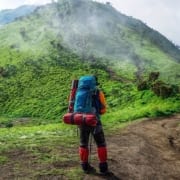Don’t Let Dietary Restrictions Get in the Way of Your Backpacking Goals
Backpacking is a great way to stay active without getting bored — every trail provides something new and exciting. However, it’s easy to burn thousands of calories each day when you’re on the trail, especially if you’re taking on rough terrain.
Needless to say, most backpackers recognize the importance of staying properly fueled. However, if you are backpacking with dietary restrictions, that might seem easier said than done. Things like food allergies or sensitivities can make it hard to get the calories you need to keep going on a long hike.
Thankfully, it’s not impossible to get the right nutrients and fuel your body in healthy, effective, and efficient ways. Learning how to do so can make each experience more fulfilling and enriching, so you can focus on your surroundings instead of your grumbling stomach. Let’s take a look at how you can maintain your strength and energy on long backpacking hikes, even if you have to deal with dietary restrictions.
Plan the Perfect Trip
Packing snacks for the trail can be easy enough, even if you go with the same “stand by” snacks every time. However, unless you’re camping after a hike, the most important way to keep yourself properly fueled is by eating a healthy meal before you hit the trail and after you’re done.
So, it’s a good rule of thumb to choose backpacking locations that are surrounded by places that fit your dietary needs. For example, if you’re a vegetarian or vegan, it’ll be easier for you to find healthy, filling options in trails close to cities that cater to plant-based diets. Some of the best areas in the country for plant-based tourists include:
- Portland, Oregon
- Austin, Texas
- Philadelphia, Pennsylvania
- Phoenix, Arizona
- Chicago, Illinois
Backpacking should be fun and exciting. It’s all about exploration and discovery. However, that doesn’t mean you can’t enjoy some of the perks of “city life” while you’re on your trip. While backpacking, search for local restaurants that cater to your dietary needs, and you’ll have an easier time fueling up and recharging.
Understand Backpacking Food Basics
Whether you’re an experienced hiker or you’re hitting the trail for the first time, you probably understand how important it is to have enough food with you. However, far too many backpackers make the mistake of not packing enough nutrient-dense items. There are some essential rules to follow when it comes to backpacking food basics, including:
- Choosing shelf-stable ingredients;
- Packing plenty of lightweight food, including freeze-dried and dehydrated items;
- Packing calorie-dense items;
- Understanding cooking times.
The more you understand how to pack your food efficiently, the easier it will be to pack snacks and meals that meet your caloric needs and take your dietary restrictions into account while backpacking.
Yes, we suggested meals. Sometimes, when you have restrictions that require certain ingredients to be eliminated, small snacks won’t cut it. Thankfully, there are plenty of pre-packaged and even stoveless meals you can take with you on the trail. Nowadays, you can find vegan options and gluten-free options, as well as pre-made meals that will offer warnings and disclaimers about any ingredients that may cause allergic reactions.
It can take a bit of time, research, and even some trial and error to find pre-packaged meals and snacks that meet your needs and taste great. Don’t be afraid to try different brands and options, and you’ll eventually find what works best for you.
Create Your Own Snack Hacks
While there are plenty of pre-packaged snacks and meals on the market, sometimes the easiest way to meet your dietary needs is to make your own. You know your restrictions better than anyone. Sometimes it’s better to be safe than sorry when it comes to ingredients.
Plus, when you’re in charge of preparing your own snacks and meals, you can choose flavors you love, and you won’t get bored on the trail. Having something delicious and nutritious to look forward to can keep you motivated and energized long before you dig in.
It can take a bit of creativity to prepare meals and snacks, depending on your dietary restrictions. For example, many people take nuts or trail mix with them while backpacking. Nuts are a great source of protein and can provide a quick energy boost. However, if you have a nut allergy, those pre-packaged mixes aren’t an option.
Thankfully, you can create your own with things like seeds, dried fruits, and different spices. Not only will making your own snacks allow you to leave out ingredients you can’t have, but you’ll also be in control of sugar content, fat, and flavor.
You don’t have to be a pro in the kitchen to create snacks and meals that meet your restrictions and taste great. Don’t be afraid to experiment with different foods and flavors. It can end up saving you money and keeping you properly fed and fueled on your trip.
There’s no reason dietary restrictions should get in the way of your backpacking goals. Keep these tips in mind to stay safe, healthy, and energized on the trail.
About the author









Leave a Reply
Want to join the discussion?Feel free to contribute!